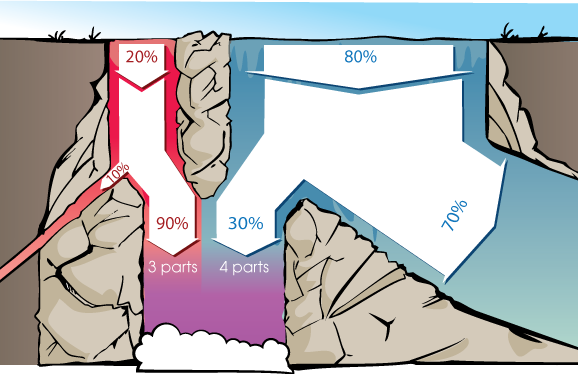Bayesian reasoning is a collection of methods of inquiry based on [Bayes' Theorem](https://en.wikipedia.org/wiki/Bayes%27_theorem). It is a popular trope in the [online rationalist community](https://www.lesswrong.com). Despite the [proliferation](https://en.wikipedia.org/wiki/List_of_things_named_after_Thomas_Bayes) of methods and models stemming from the theory, each approach shares the common strategy of basing predictions on probabilities that arise from prior knowledge, commonly referred to as "priors." Broadly, it emphasizes forming beliefs that are aligned with evidence, evaluating existing beliefs in light of new evidence, and testing new beliefs against a preponderance of evidence. Some neuroscientists have hypothesized that this is the [primary behavioral function](https://en.wikipedia.org/wiki/Bayesian_approaches_to_brain_function) of the brain.
The essential rule for Bayesian reasoning is to update one's beliefs after receiving evidence about them. It is a means of illustrating the utility of the term *ratio* as a prefix for *rationality*, an accepted term for reasoning. As a practice, rationality is determining the higher proportion of accuracy given a set of possibilities, and Bayes' theorem provides a specific formula for doing so.

#### Prior Knowledge
"Priors" are settled beliefs and facts about the world that enable us to form a hypothesis about our present inquiry. Technically, these are "prior probabilities" rather than "knowledge."
#### Confidence
Confidence is the degree of certainty assigned to a belief. Confidence should never be 100%. You should only be 99.999999...% certain the sun will rise in the east tomorrow. Confidence is continuously updated as new information is revealed. Updating confidence requires attention to how well a belief is supported new evidence *and* ones priors. Failing to acknowledge priors leads to the [[Cognitive Bias#^7c9373|base rate fallacy]].
#### Evidence
Evidence is information obtained either through direct inquiry and experiments, or passive observation. The best kind of evidence is logged and saved so it can be reviewed, analyzed, and available for verification by third parties. [[Orders of evidence]] should be considered when collecting data, particularly from third parties. Information *about* the evidence, such as the original motivation for its collection, may influence the kinds of observations in the data set.
## Thoughts
[Thinking like a Bayesian](https://psyche.co/guides/how-to-think-like-a-bayesian-and-make-better-decisions) requires a few shifts in conventional thinking:
1. Refute all-or-nothing terms for a belief. [[Absolute, totalizing reason]] leads to a [[Is certainty a cognitive bias?|certainty trap]].
2. Consider a belief along a spectrum of possibility. How much confidence assigned to a belief should be consistent with the amount of evidence available.
3. Attend to orders of evidence. Evidence is not only information directly related to a claim but also includes indirect information, such as its source, that lends it credibility. Employ the rule of [[conservation of expected evidence]]. When the expected evidence for a claim does not arise, look for evidence that refutes it.
4. Grow comfortable working in degrees of confidence, nuance, and complexity. Accept that beliefs will change.
5. Approach knowledge and confidence as something to be gained incrementally, through an accumulation of not-quite-certain information and small adjustments to previous beliefs. As a belief grows in confidence, refer back to rule #1.
* [Neurath's boat](https://en.wikipedia.org/wiki/Neurath%27s_boat) is a useful model, similar to the [[ship of Theseus]] but applied to knowledge. The boat represents an idea set, which are modified according to new information. In this metaphor, the boat is reconstructed at sea using the existing structure, rather than having parts incrementally replaced with external resources.
## Notes
- Subjective Bayesianism is a branch of epistemology that considers beliefs as a set of probabilities and theorizes how "ideally rational" agents behave when faced with uncertainty. It is a formal way of approaching what happens unconsciously in most rational people.
- Interestingly [Bayes](https://en.wikipedia.org/wiki/Thomas_Bayes), the hero of atheist rationality, was a priest.